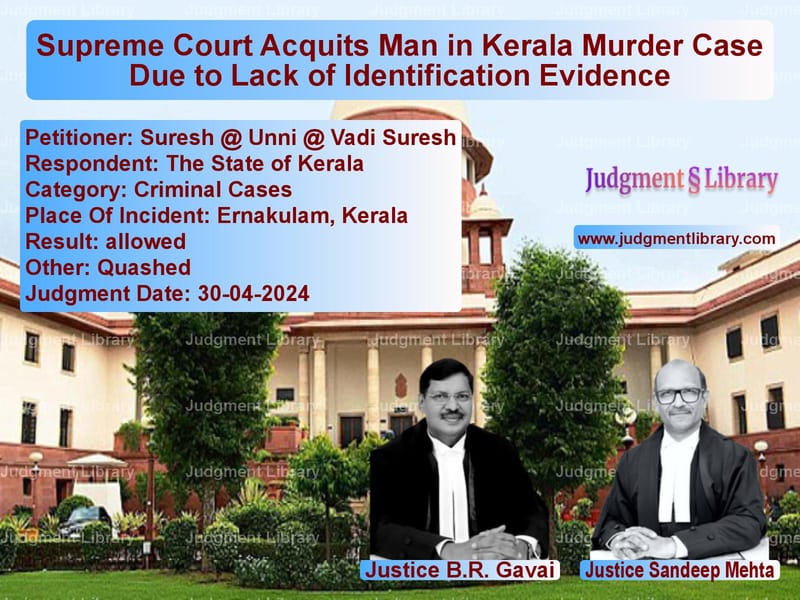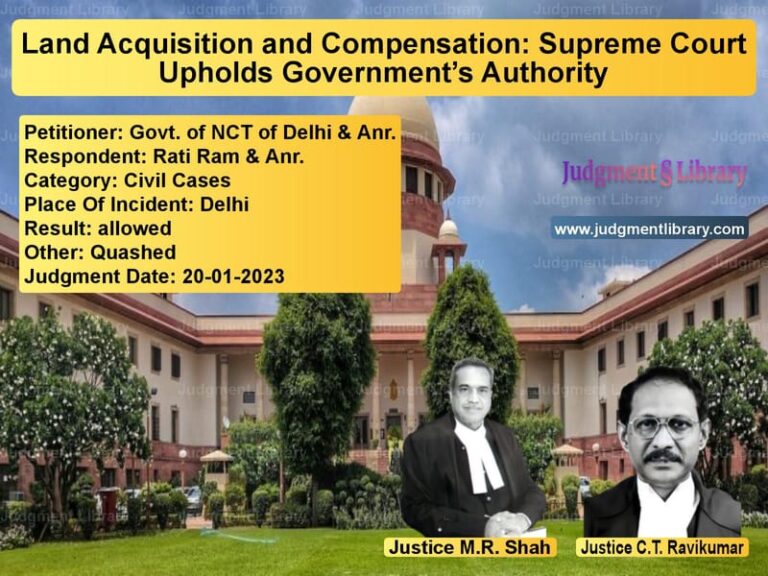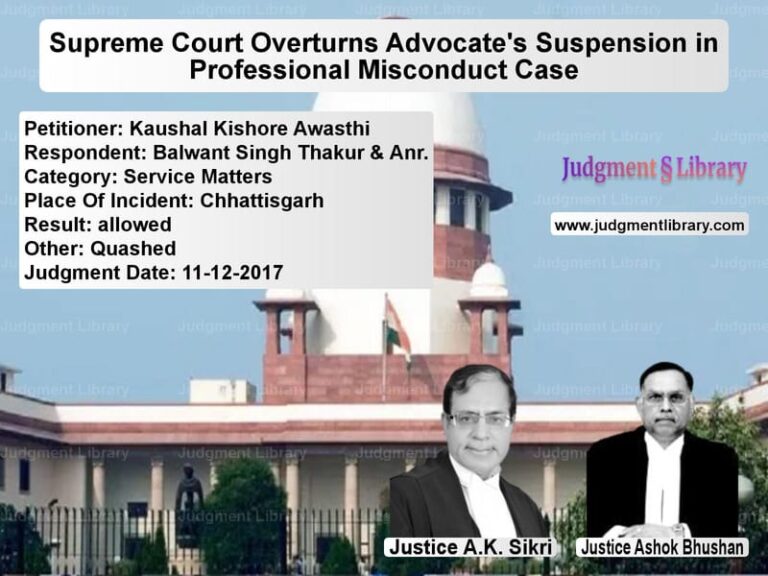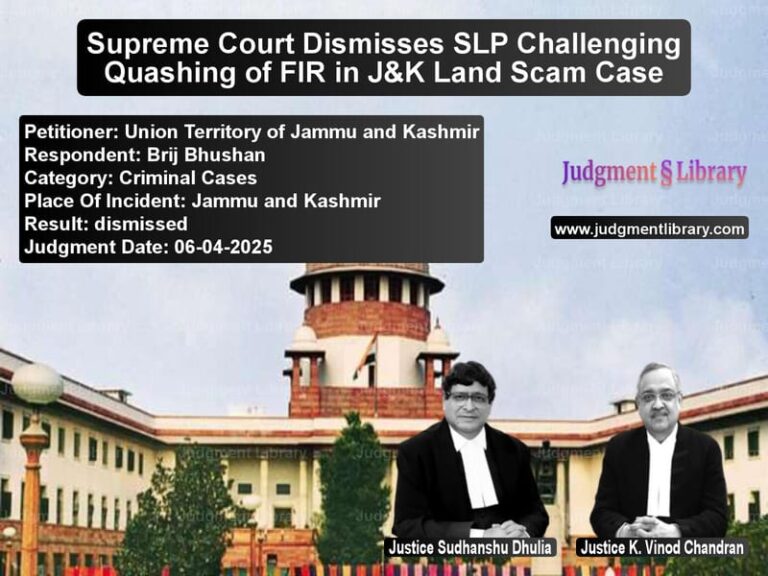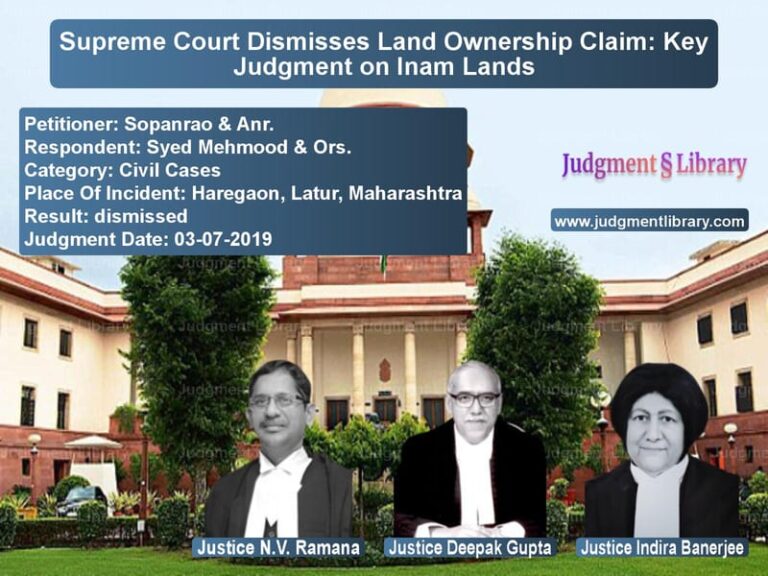Supreme Court Acquits Man in Kerala Murder Case Due to Lack of Identification Evidence
The case of Suresh @ Unni @ Vadi Suresh vs. The State of Kerala revolves around a criminal appeal challenging the conviction of the appellant in a case involving murder, attempt to murder, unlawful assembly, and other related charges. The Supreme Court had to determine whether the evidence presented, especially the lack of a proper identification process, was sufficient to sustain the conviction.
Background of the Case
The case dates back to March 6, 2006, when an unlawful assembly attacked a video shop owner, Ajeesh (PW-2), and his friend, Kapil (deceased), in Ernakulam, Kerala. The attackers, armed with weapons and country-made bombs, injured PW-2 and fatally stabbed Kapil. Following the attack, they fled the scene in a stolen vehicle. The case was initially registered under Case Crime No. 137 of 2006.
The police investigation led to the arrest of multiple accused persons, including Suresh, who was arrested in 2008, two years after the incident. The trial court convicted Suresh under Sections 302, 307, 143, 147, 148, 324, 326, 427, and 449 read with Section 149 of the Indian Penal Code (IPC) and sentenced him to life imprisonment. The Kerala High Court upheld the conviction but reduced the sentence under Section 307 IPC from life imprisonment to 10 years of rigorous imprisonment.
Arguments by the Petitioner (Suresh @ Unni @ Vadi Suresh)
- The accused was identified for the first time in court by PW-1 and PW-2, years after the incident, without any prior Test Identification Parade (TIP).
- PW-1 and PW-2 admitted that they did not know Suresh before the incident.
- The police had shown the accused to the witnesses before trial, which tainted the identification process.
- The case was based on circumstantial evidence, as no direct evidence linked the accused to the crime.
- The prosecution’s claim of recovery of a weapon (iron rod) from an open place after more than two years was unreliable.
Arguments by the Respondents (State of Kerala)
- PW-2 was an injured eyewitness and could reliably identify the accused.
- Even though no Test Identification Parade was conducted, the witnesses had seen the accused at the time of the incident.
- The accused was part of a group attack, making him liable under Section 149 IPC.
- The High Court had already considered the arguments and upheld the conviction.
Supreme Court’s Analysis and Judgment
The Supreme Court analyzed the evidence and found significant weaknesses in the prosecution’s case:
- Identification of the Accused: The court noted that the accused was identified for the first time in court, four and a half years after the incident, without any Test Identification Parade. The court held that:
- “Conviction only on the basis of identification of the accused in the Court for the first time after four and a half years of the incident would not be sufficient for maintaining the same.”
- “The accused was previously unknown to the witnesses, and his name was not mentioned in the initial investigation.”
- Recovery of Weapon: The prosecution claimed that an iron rod used in the attack was recovered based on the accused’s disclosure. However, the court found that:
- The recovery was made two years and two months after the incident, making it highly improbable that bloodstains remained on the weapon.
- The recovery was from an open place, reducing its evidentiary value.
- Possibility of Mistaken Identity: The appellant was referred to as “Unni” in the first chargesheet and “Suresh alias Vadi Suresh” in the second chargesheet, indicating confusion in identity.
- Lack of Direct Evidence: The prosecution failed to establish beyond a reasonable doubt that the accused was present at the crime scene.
Based on these findings, the Supreme Court concluded:
“In the result, the appeal is allowed. The judgment and order dated 30th March 2011 passed by the Additional Sessions Judge, Ernakulam, and the judgment and order dated 6th December 2012 passed by the High Court of Kerala at Ernakulam are quashed and set aside. The present appellant is acquitted of all the charges.”
Supreme Court’s Order
- The conviction and sentence imposed by the trial court and upheld by the High Court were set aside.
- The accused, Suresh @ Unni @ Vadi Suresh, was acquitted of all charges.
- He was ordered to be released from custody immediately unless required in any other case.
Conclusion
The Supreme Court’s decision highlights the importance of proper identification procedures and the need for reliable evidence in criminal cases. The judgment reinforces that convictions cannot be based on mere in-court identification without prior corroboration, especially when the accused was previously unknown to the witnesses. The ruling sets a precedent for ensuring that procedural lapses do not lead to wrongful convictions in cases based on circumstantial evidence.
Petitioner Name: Suresh @ Unni @ Vadi Suresh.Respondent Name: The State of Kerala.Judgment By: Justice B.R. Gavai, Justice Sandeep Mehta.Place Of Incident: Ernakulam, Kerala.Judgment Date: 30-04-2024.
Don’t miss out on the full details! Download the complete judgment in PDF format below and gain valuable insights instantly!
Download Judgment: suresh-@-unni-@-vadi-vs-the-state-of-kerala-supreme-court-of-india-judgment-dated-30-04-2024.pdf
Directly Download Judgment: Directly download this Judgment
See all petitions in Bail and Anticipatory Bail
See all petitions in Murder Cases
See all petitions in Custodial Deaths and Police Misconduct
See all petitions in Judgment by B R Gavai
See all petitions in Judgment by Sandeep Mehta
See all petitions in allowed
See all petitions in Quashed
See all petitions in supreme court of India judgments April 2024
See all petitions in 2024 judgments
See all posts in Criminal Cases Category
See all allowed petitions in Criminal Cases Category
See all Dismissed petitions in Criminal Cases Category
See all partially allowed petitions in Criminal Cases Category

